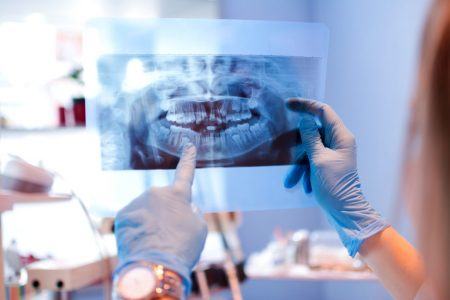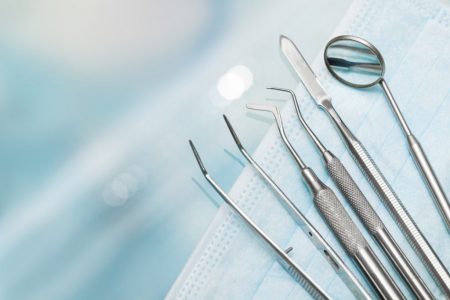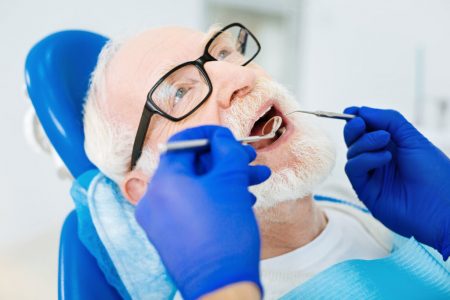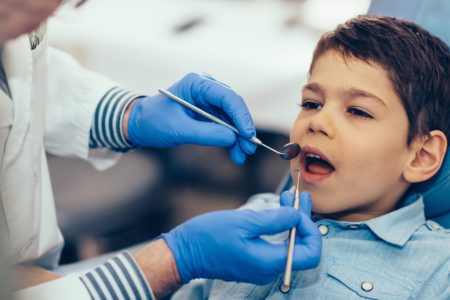THE IMPORTANCE OF A DENTAL HYGIENIST
Nearly everyone who visits the dentist’s office for a biannual check-up is familiar with the role of the dental hygienist. The dental hygienist acts like a gatekeeper to the world of oral health. A hygienist performs the deep clean of your teeth, flags trouble spots that could become cavities, reviews how diet can affect the health of your mouth, and much more. A dental hygienist works with a patient to prep for an appearance before the dentist, such as for crown and filling procedures.
The work of a dental hygienist goes a long way to prevent tooth decay and maintain a patient’s oral health. The importance of having hygienists on staff cannot be understated! Here’s an overview of just how crucial the role is to any thriving dental practice.
WHAT DOES A DENTAL HYGIENIST DO?
The American Dental Hygienists Association (ADHA) defines dental hygienists as “licensed oral health professionals who focus on preventing and treating oral diseases – both to protect teeth and gums, and also to protect patients’ total health.”
Dental hygienists must be licensed by the state they work in. This requires graduating from a college or university dental hygienist program as well as passing a written national board examination and a state clinical examination, according to DentalCareersEDU.org.
As licensed professionals, dental hygienists perform most of their work independently –unlike dental assistants, who must work directly under the supervision of a licensed dentist.
Above all, a dental hygienist’s most important duty is to advise patients on how to keep their teeth free of plaque. Plaque is the sticky coating that forms constantly on your teeth. Your dental hygienist can also work with you, your dentist and specialists to create a tailored routine to prevent tooth decay and keep other oral health problems at bay.
Although the range of services dental hygienists perform can vary from state to state, the ADHA lists the position’s core responsibilities:
- Perform oral health care assessments that include the review of patients’ health history, dental charting, oral cancer screening, and evaluation of gum disease / health;
- Expose, process, and interpret dental radiographs (x-rays);
- Remove plaque and tartar from above and below the gumline using dental instruments;
- Apply cavity-preventive agents such as fluorides and sealants to the teeth;
- Administer local anesthetic and / or nitrous oxide analgesia
- Educate patients on proper oral hygiene techniques to maintain healthy teeth and gums;
- Counsel patients about plaque control and developing individualized at-home oral hygiene programs;
- Administer smoking cessation programs;
- Counsel patients on the importance of good nutrition for maintaining optimal oral health.
In some practices, a dental hygienist can also perform teeth whitening procedures prescribed by the supervising dentist.
In addition to carrying out these duties, a good dental hygienist will also demonstrate ease and competence with the various instruments and tools in a dental office.
For proof of the wonders that a skilled dental hygienist can make happen, look no further than these before-and-after photos of basic teeth cleanings.

WHAT IS THE DIFFERENCE BETWEEN A DENTIST AND A DENTAL HYGIENIST?
Given the independent and exhaustive nature of the work of a dental hygienist, you may be wondering what the difference is between a hygienist and a dentist – or why a dental practice often keeps both roles on staff.
The simple answer is, a good dental hygienist eases the dentist’s burden, freeing up the dentist to perform more advanced procedures. The dental hygienists tackles the general, everyday cleanings that do not vary much from patient to patient; while the complicated, individualized procedures like cavity fillings and root canals fall under the dentist’s purview.
While dentists can perform routine cleanings, more practices these days realize that dental hygienists are specially trained to carry out scaling and polishing (fancy terms for tooth cleaning), and can dedicate more time to educating patients on what they can do at home to prevent tooth decay.
The time a dental hygienist can devote to a patient also plays a role in the dentist’s ability to diagnose serious oral health issues. A hygienist can spot and identify abnormalities as they develop and should alert your dentist immediately to treat such problems promptly, before they can advance any further.

Close-up of female doctor pointing at teeth x-ray image at dental office.
Dentist and author Dr. Tom McGuire, who maintains the Mercury-Safe Dentist Internet Directory, adds that a hygienist’s role in helping a patient understand the measures they must take at home to protect their teeth is critical to a dentist’s own success. As he writes:
“I quickly discovered that I simply could not afford to take the time to provide patients with all the information I knew they needed. I also learned that the available brochures, videos, and handouts are not very effective.”
After hiring a dental hygienist for his practice, Dr. McGuire noted that once patients learned the basics of oral care from the hygienist, he could tailor the rest of their oral hygiene prevention program to meet their needs, advancing their health instead of devoting his time to remedial dental education.
Thus, Dr. McGuire writes, dental hygienists play a “critical role” in the success of any dental wellness education program, as such a strategy is dependent on an expert who supports, guides, and regularly monitors a patient’s oral hygiene.
VISITING THE DENTAL HYGIENIST
There are two things every patient should keep in mind when visiting the dental hygienist for a routine cleaning: try to be on time, and be honest about your at-home dental care, eating, and drinking habits.
These tips may seem like no-brainers, but both are essential to having a productive appointment and maintaining healthy teeth. Consider the number of things a dental hygienist needs to do during your limited time at the practice, as detailed on Dental Products Report:
“A simple list of a basic things hygienists must do during an appointment includes: go over a patient’s health history; take vitals; discuss concerns about your teeth; take several different measurements to monitor the health of your gums (gum recession, pocket depths, bleeding points, tooth mobility, etc.); take X-rays; screen for oral cancer and abnormalities; clean your teeth; polish your teeth; floss; educate on home care recommendations and the status of your gum health; help the doctor with the exam; explain and answer any questions regarding recommendations of treatment; write chart notes; and disinfect the room for the next patient.”

Set of metal Dentist’s medical equipment tools
So, it’s quite important to be on time (or better yet, early) for your appointment. If you show up late, the dental hygienist will still perform all aspects of your routine checkup, because there would otherwise be the potential to miss something significant (like an early sign of oral cancer) that may be not looked at again for at least six months. There are no cutting corners when it comes to proper oral care, but showing up 10 minutes late for an appointment is going to push back the entire lineup of patients for the day – and you wouldn’t want to be responsible for that, would you?
Of course, unforeseen circumstances, such as a patient who needs emergency treatment, can easily put dental hygienists behind. If that’s the case, understand your hygienist is doing everything in his or her power to keep your appointment in a timely manner – some things are just out of their control.
As Dental Products Reports succinctly summarizes,
“Staying on time isn’t always easy and running late isn’t always our fault. Working against the clock, day in and day out, isn’t as easy as it seems as not everything is in our control.”
As for the other tip – be honest – well, let’s just say your hygienist will be able to tell when you scrimp on flossing, regularly fall asleep without brushing your teeth, or binge on candy and other sweets. Share your concerns with your dental hygienist – that is what he or she is there for!
A good dental hygienist wants you to succeed in keeping your teeth strong and leading a generally healthy lifestyle, and is a resource in helping you achieve that. Whether you need to clean up your eating habits, brush up on the latest flossing techniques, or even quit smoking, your dental hygienist can help you devise an at-home oral hygiene routine that you can stick to.
DENTAL HYGIENISTS PROVIDE ACCESS TO ORAL CARE
A dental hygienist’s primary role is to prevent and treat oral diseases, a duty that is crucial to maintaining overall health. Unfortunately, there are many underserved populations in the United States who do not have access to this kind of preventive care that can do so much to advance the health of so many. There are, however, movements toward making basic dental care accessible to all. Dental hygienists stand at the heart of these campaigns.
According to a National Governors Association report titled “The Role of Dental Hygienists in Providing Access to Oral Care,” the rate of tooth decay, periodontal diseases, oral cancers and other problems is high and certain populations groups, including low-income Americans and minorities, are disproportionately affected. These conditions are all preventable with basic dental care, but for many, such treatment too expensive to keep up with, or they lack access to transportation required to regularly visit the dentist, among other hurdles.
The report goes further to state that increasing delivery of affordable dental services outside the dentist’s office may help to reduce the most serious issues related to limited access to dental care.
As Dentistry IQ writes in an summary of the report:
“Dental hygienists are capable of assuming an even more important role in expanding affordable access.”
Some states have looked into policies that would encourage and permit dental hygienists to work outside of dental practices, and go into the field to better work with underserved people. The work of a skilled dental hygienist can go a long way in helping improve the health of the country!
WHY WE SHOULD ALL LOVE OUR DENTAL HYGIENIST

Caring about health. Close up of calm patient sitting on the dental chair while skilled stomatologist using instruments and curing his teeth
If it isn’t already obvious, we should all love for our dental hygienist for his or her expertise in gently cleaning our teeth and helping us to prevent tooth decay and other oral health issues. But we must also understand what it is like to be a dental hygienist in order to truly appreciate the work they do.
First, as the American Dental Education Association (ADEA) states, many people who choose to become dental hygienists do so because it provides them with an opportunity to positively impact the oral health of every person who sets foot in their dental practice.
According to the ADEA, a successful dental hygienist is a person who is:
- Patient and understanding – A dental hygienist must be able to work with panicky patients and help them to relax to better treat them;
- Detail-oriented – The mouth is small, so a good dental hygienist must pay close attention to when working in a patient’s mouth. He or she must also be nimble and dexterous when cleaning and examining a patient’s teeth, as the slightest nudge to a sensitive tooth can be very painful for the person sitting in the chair;
- Passionate – When a dental hygienist is passionate about oral health, he or she can serve as a great role model to patients who should follow suit;
- Sturdy – A dental hygienist’s day involves hours of sitting, standing, performing repetitive movements, and walking around the practice, so it is important he or she has the stamina to keep it up all day;
- Positive – A positive attitude goes a long way with patients who want someone friendly, energetic, and outgoing to ease their nerves about a visit to the dentist.
What’s not to love about a person who embodies these qualities?
Furthermore, dental hygienists often have to deal with some unpleasant things in their daily work – infections and rotting food lodged between teeth to name a few – yet they do so with a smile on their face and with the utmost professionalism. After all, that’s what they went into this business to do: care for people’s oral health, for better or for worse.
As the experts at Dental Products Report write,
“The point is, while a dental hygienist’s job may seem gross to many, it’s all to keep our patients healthy. Our goal is to prevent disease or stop disease if it’s already started. A healthy mouth is a healthy body as many bodily diseases have been linked to bacteria from the mouth and the chronic inflammation that ensues. Just some examples include heart disease, Alzheimer’s, certain cancers, low birth weight and preterm babies, diabetes—and this list could go on. If that means we have to see and smell gross things, it’s totally worth it for the health of our patients.”
Now that’s the voice of a quality dental hygienist worth appreciating!
HOW DO YOU BECOME A DENTAL HYGIENIST?
If all this talk about dental hygienists has piqued your interest for a potential career in the field, here’s what you need to know.

Little boy having regular dental check-up. Toned image
The minimum education requirement for state licensure of a dental hygienist is an associates degree, which takes about two years to achieve. Then a prospective hygienist must complete a clinical externship before taking a state-authorized licensure examinations and the National Board Dental Hygiene Examination. It’s a lot of work, and another reason for us all to appreciate our favorite dental hygienist!
Additionally, the American Dental Association (ADA) points out that a career in dental hygiene offers the following challenges and rewards:
- Personal satisfaction – Personal fulfillment comes from establishing trust with patients and providing them with a valuable health care service;
- Prestige – Dental hygienists are highly respected members of a dental health care team, thanks to their education and training in such a skilled discipline;
- Variety – A dental hygienist must meet the oral health needs of a variety of people day in and day out. A hygienist has the opportunity to serve special population groups like children, the elderly, and the disabled, and the daily work requires using a variety of interpersonal and clinical skills;
- Creativity – Serving such a diverse population with different needs requires creativity in approach to patient management and oral health education;
- Flexibility – With full- and part-time employment opportunities and evening and weekend hours, a flexible work-life balance is absolutely possible for a dental hygienist;
- Security – Dental hygienists are currently in high demand, and the profession is one that is needed and valued by most of the population.
The ADEA, citing the U.S. Bureau of Labor Statistics, writes that the employment of dental hygienists is expected to grow nearly 20% by 2026, and the profession is No. 17 in U.S. News and World Report’s 100 Best Jobs list in 2018. It is certainly a career that is worth the preparation – not to mention the potential to positively impact the oral health and lives of many!
For any questions, contact your nearest Columbia Dental office. At Columbia Dental, all of our locations across Connecticut provide complete oral care for the entire family. Plus, we offer convenient hours, so your kids receive the proper children’s dental care when it fits your schedule. Call us at 860-645-0111 to learn more today.
Go Back